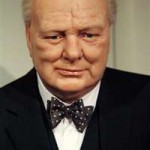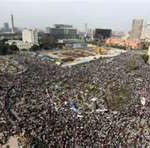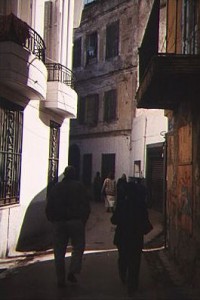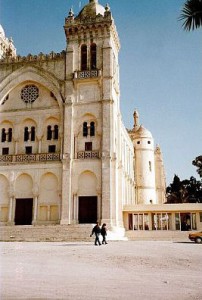Perhaps America’s climb to world power is due more to the ability of its ordinary citizens to make a decent living than simply because it practices a form of democracy.
Despite racism and other sins, for most of its history the United States has constantly been renewed by immigrants coming to make a new life, start new businesses, and provide their children with a good education. Yes, they became participants in our political processes, but they also took advantage of the ability to thrive economically.
Surely Americans cannot be faulted for encouraging democracy in other nations as a major part of our foreign policy. Yet our push for democratic institutions has worked best where we have also pushed economic incentives, such as the Marshall Plan for Europe following World War II.
In the Middle East and North Africa, democracy has stalled. Amaney A. Jamal and Michael Robbins write: “It appears that the people of the Arab world have internalized one lesson above all from the revolts of the last decades: democratic change does not necessarily produce economic improvement.” ( “Why Democracy Stalled in the Middle East,” Foreign Affairs, March-April 2022)
Tunisia, where I lived for a few years, appeared to have perhaps the best chance for an Arab nation to develop a democracy. With a low birth rate, an educated population, and a generally homogenous society, Tunisians appeared set for a democratic awakening when the strong man ruler, Zine el Abidine Ben Ali, was overthrown in 2011 in a bloodless coup.
Unfortunately, in July 2021, the current popularly elected Tunisian leader, Kais SAIED, seized exceptional powers, fired the prime minister, and suspended the legislature.
Both Ben Ali’s earlier overthrow, and the powers assumed by the current leader, were occasioned by economic problems, including low job expectations for young people.
Here in the United States, even though our economy is growing, the change in job structure has led to the loss of good jobs for many. Geographically, some areas are thriving while others have suffered.
At the same time, our tax policies favor those who are already wealthy in keeping and growing huge amounts of their wealth, not in encouraging more equitable taxation. Such taxes could be used for programs like child care and education and job training to bring others into the mainstream.
Obviously, the wealthy have more money to invest in political campaigns for keeping the status quo than do the non wealthy. Some of those political campaigns may play on falsehoods about election counts rather than on needed changes to our tax system.
Nevertheless, if the U.S. is to endure as an influential nation, those changes must come. The country must be seen as economically fair as well as politically healthy.



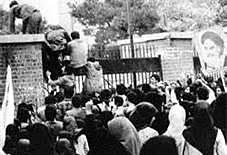
 Today’s revolutions accelerate with the instant communication of Facebook and text messages. Building a new nation requires a quieter courage: a patience to examine complex issues and an ability to find compromise between competing views of a nation’s future.
Today’s revolutions accelerate with the instant communication of Facebook and text messages. Building a new nation requires a quieter courage: a patience to examine complex issues and an ability to find compromise between competing views of a nation’s future. The revolutionists in Egypt and Tunisia vanquished corrupt dictators. Now can they survive the hard slogging? Compromise on cherished views to include the views of others? Set up impartial courts and rules of law that discourage the same corruption that bedeviled the old regimes?
The revolutionists in Egypt and Tunisia vanquished corrupt dictators. Now can they survive the hard slogging? Compromise on cherished views to include the views of others? Set up impartial courts and rules of law that discourage the same corruption that bedeviled the old regimes?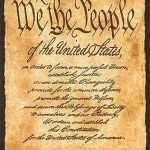 Our country formally gained independence from Great Britain in 1783. But the first structure we accepted for the new country, the Articles of Confederation, failed. After a fierce struggle between competing factions, we began again with the creation of the U.S. Constitution, ratified by Rhode Island, the final former colony to do so, in 1790. It’s an amendable document, meaning that the founders of the nation knew it wasn’t perfect and never would be.
Our country formally gained independence from Great Britain in 1783. But the first structure we accepted for the new country, the Articles of Confederation, failed. After a fierce struggle between competing factions, we began again with the creation of the U.S. Constitution, ratified by Rhode Island, the final former colony to do so, in 1790. It’s an amendable document, meaning that the founders of the nation knew it wasn’t perfect and never would be.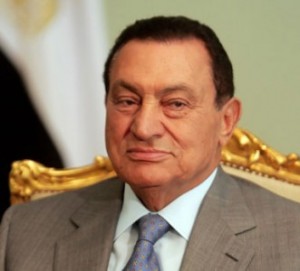 In those earlier times, the U.S. was accused of supporting dictatorial regimes in certain African and South American countries because the regimes touted themselves as anti-communist. Now the U.S. is accused of propping up former dictators like Ben Ali in Tunisia and Mubarak in Egypt. These men clamped down on the growth of Islamists in their countries, so we supported them even if they employed brutal methods. Egypt, especially, became a huge recipient of U.S. aid.
In those earlier times, the U.S. was accused of supporting dictatorial regimes in certain African and South American countries because the regimes touted themselves as anti-communist. Now the U.S. is accused of propping up former dictators like Ben Ali in Tunisia and Mubarak in Egypt. These men clamped down on the growth of Islamists in their countries, so we supported them even if they employed brutal methods. Egypt, especially, became a huge recipient of U.S. aid.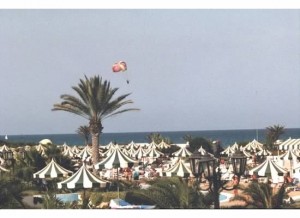 I search news reports for clues about a country’s first encounters with democracy. That country is Tunisia, where I once lived and worked. I scan the recent pictures. When I lived there, few women, and no younger ones, wore the head scarf. Most of them dressed like counterparts on the streets of Paris. Now the head scarf appears more often. Plenty of women do not wear it, but it still surprises me that some do.
I search news reports for clues about a country’s first encounters with democracy. That country is Tunisia, where I once lived and worked. I scan the recent pictures. When I lived there, few women, and no younger ones, wore the head scarf. Most of them dressed like counterparts on the streets of Paris. Now the head scarf appears more often. Plenty of women do not wear it, but it still surprises me that some do.